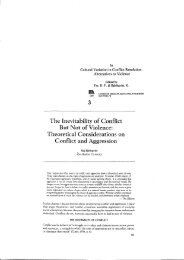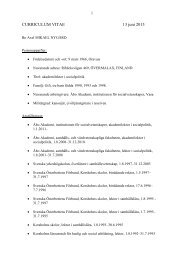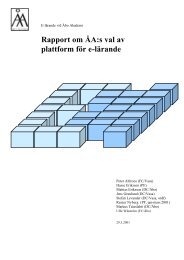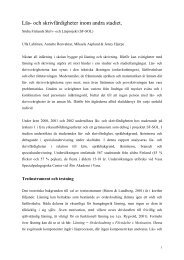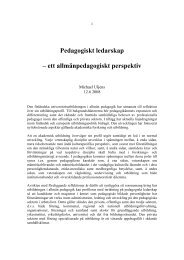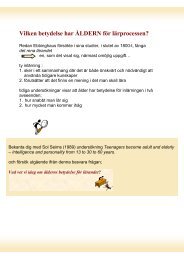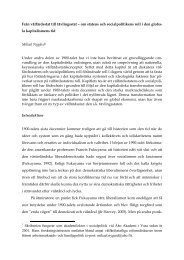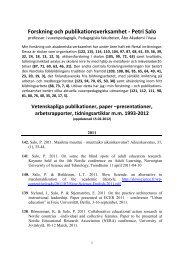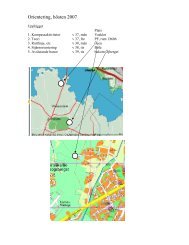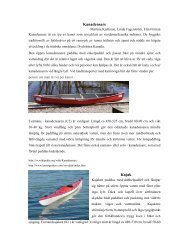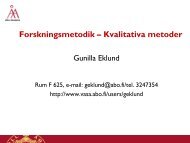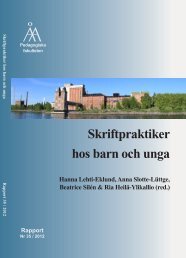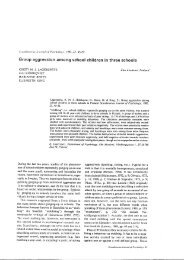Parties, Candidates and Citizens On-Line - Åbo Akademi
Parties, Candidates and Citizens On-Line - Åbo Akademi
Parties, Candidates and Citizens On-Line - Åbo Akademi
Create successful ePaper yourself
Turn your PDF publications into a flip-book with our unique Google optimized e-Paper software.
26; Römmele 2003, 9-11). Therefore, regarding the evolution of campaign<br />
communication:<br />
“The new technology allows for forms of political communication that can be<br />
located schematically somewhere between the local activism of the premodern<br />
campaign (with direct town-hall meetings <strong>and</strong> political rallies) <strong>and</strong> the nationalpassive<br />
forms of communication characteristic of the modern television<br />
campaign […] as political use of the internet exp<strong>and</strong>s, the postmodern<br />
campaign does seem destined to add yet another distinctive layer of<br />
communication […] supplementing other existing channels” (Norris 2001a,<br />
149)<br />
However, as the internet has become more commonplace in society, scholars have<br />
questioned whether the internet will have such a ‘distinctive’ impact on traditional<br />
political life. Two core arguments merit attention: firstly, when traditional political<br />
organizations employ the web, there is little reason to believe that the ‘new politics’ will<br />
be that much different from ‘politics as usual’ (e.g. Davis 1999; Kamarck 1999; Margolis<br />
& Resnick 2000). Secondly, scholars have argued that politics on the internet could fail to<br />
vitalize the citizens’ political participation. The internet, they say, will primarily be used by<br />
citizens who are already politically interested <strong>and</strong> active, resulting in a situation where the<br />
political actors are so-to-speak simply ‘preaching to the converted’ on-line (Hill & Hughes<br />
1998, 185-186; Norris 1999; 2001b, 229-231).<br />
***<br />
This thesis focuses on two aspects of internet politics; the use of the internet, mainly in<br />
political campaign contexts, by a) political actors <strong>and</strong> b) citizens. The thesis has two<br />
delimitations which need to be addressed. Internet politics can be divided into three<br />
general areas (Margolis & Resnick 2000, 8-21): intra-net politics, which exists within the net<br />
with no connection to the real world, politics that affect the net referring to actions taken offline<br />
which regulate the on-line environment, <strong>and</strong> political uses of the net containing the online<br />
activity, with the purpose of affecting off-line politics, of traditional political actors<br />
such as parties, c<strong>and</strong>idates, government <strong>and</strong> interest groups. The focus of this thesis is<br />
clearly within this third area of internet politics. It is primarily centred on the on-line<br />
activity of traditional political actors – i.e. the political actors whose activity has been<br />
regarded as essential to modern day representative democracy (Norris 2003, 21-22; Sartori<br />
1976, 24) – <strong>and</strong> is only to a limited extent concerned with the activity of other types of<br />
organized interests. The thesis is not, however, focussed on the adoption <strong>and</strong><br />
employment of the internet by non-traditional political actors, such as transnational<br />
advocacy networks <strong>and</strong> new social movements. These non-traditional actors have been<br />
10



